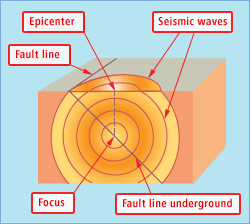 |
|||||||||||||||||||||||||||||||||
|
Earthquakes
The Basics What are they? When people think of earthquakes, they often picture the ground cracking open, roads and bridges buckling and breaking apart, buildings collapsing, and people being injured or killed. Such disasters frequently result from earthquakes, although many earthquakes are so small that people can barely feel them. What causes earthquakes? Why are some earthquakes worse than others? These and many other questions have been answered by seismologists, the scientists who study shaking motions of the Earth. Earthquakes are natural events that occur as part of the geological processes that form the earth's mountains, oceans, valleys, and plains. Over the last 100 years or so, scientists have learned a great deal about these processes, including earthquake's causes, how to measure them, and where they occur. Through studying earthquakes, scientists have learned much about the earth itself.
What causes them? An earthquake occurs because of geologic forces inside the Earth. These
forces build up slowly and eventually become so strong that they cause
rocks to break underground. When this happens, tremendous energy is released
suddenly in the form of motion that spreads out in all directions from
the break, causing the ground to shake and move. This sudden release of
energy and movement is what makes an earthquake so destructive. |
||||||||||||||||||||||||||||||||

